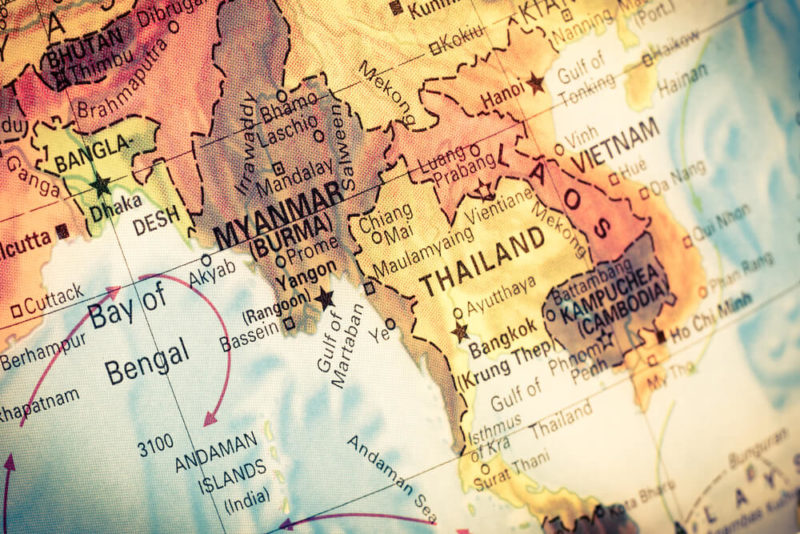Myanmar VPN Ban: What Happens If You Get Caught in 2026?
The Myanmar VPN ban is a proposed legal measure that would prohibit the use of virtual private networks across the Southeast Asian country. Join us as we explore the historical background and potential impact of the proposed law.
In the years since the military coup of February 2021, Myanmar has witnessed a dramatic deterioration in digital freedoms. The authoritarian junta has tightened its grip on power, imposing severe restrictions on the internet. Its latest proposal, a full Myanmar VPN ban, would send even the best VPNs scrambling to work in the country, like in China.
If enacted, the ban would make it illegal for citizens to use any VPN service to access the internet, with violators risking jail time and hefty financial penalties. The move is seen as yet another attempt by the military regime to restrict internet freedom, stifle freedom of expression and tighten its grip on the flow of information within the country.
In this article, we’ll look into the background and implications of Myanmar’s proposed virtual private network ban, exploring the current state of the internet in the country and the potential consequences for internet users who try to circumvent the junta’s online censorship efforts.
-
04/26/2024 Facts checked
We expanded our previous article to include more information about the background of the current conflict, as well as new information about the specific fines and other implications of the proposed VPN ban in Myanmar.
The Myanmar VPN Ban at a Glance
Freedom of Speech in Myanmar
The military coup has had a devastating impact on freedom of speech and digital rights in Myanmar (also known as Burma). The junta’s clampdown on dissent has targeted journalists, activists and ordinary citizens who dare to criticize the military regime or call for democratic reforms. It claims the power to block websites that might host any dissenting speech.

of rebels now controls at least 60% of the country.
One of the most alarming aspects of the junta’s assault on human rights has been its systematic targeting of the press. Since the coup, dozens of journalists have been arrested, with many facing lengthy prison sentences on trumped-up charges. Several media outlets have been forced to shut down, and the ones that do remain are subject to strict censorship.
The military has imposed a digital dark age on the people of Myanmar, denying them information and the ability to communicate freely. To quote experts at the UN Human Rights Commission:
“Online access to information is a matter of life and death for many people in Myanmar, including those seeking safety from indiscriminate attacks by the military.”
The Role of VPNs in Bypassing Internet Restrictions
In the face of repression, many Myanmar citizens have turned to VPNs as a means of accessing information and bypassing the junta’s internet censorship efforts. VPNs have become a crucial tool for freedom of expression, allowing people to communicate anonymously and access restricted content online.
VPNs have been particularly important for activists, journalists and political dissidents who have been forced to operate in the shadows. By using a VPN, they can safely access banned social media platforms, online news sources and other digital tools to coordinate their resistance efforts and communicate with the outside world.
The Proposed Virtual Private Network Ban
The proposed new cybersecurity law is part of a broader effort by military officials to further tighten their control over information and bolster their ability to block online content in Myanmar. The junta has long been concerned about the role of digital tools and platforms in facilitating dissent, and the VPN ban is a direct response to this perceived threat.
The military government sent out a letter on Jan. 13, 2022, addressed to various ministries, telecommunications providers and internet service providers. The letter informed them of the draft bill, outlining its scope and penalties and asking for comments for improvement.
According to the proposed legislation, the use of any VPN to access the internet would be considered a criminal offense. Individuals caught using a VPN could face up to three years in prison and fines of up to 5 million kyats (approximately $2,800).
The junta has justified the proposed VPN ban by claiming that it is necessary to protect national security and public order. However, businesses — especially online service providers — have been critical of the draft law, claiming they need to use VPNs for security purposes.
Enforcement of the Proposed Law
The junta has indicated that it plans to activate surveillance technology to enforce the ban. However, since it currently only controls 30-40% of Myanmar, we believe that this is unlikely to happen.
Unfortunately, the unlikelihood of clamping down on the entire nation hasn’t stopped junta police from stopping and searching citizens on the street for VPN-enabled devices. There are reports of bribery, with corrupt police workers threatening to detain citizens using VPNs despite the law not yet having come into force.
Potential Consequences for VPN Users
Myanmar’s proposed VPN ban would be among the strictest in the world, surpassing even China’s censorship efforts. If it were enacted, those who continue to use VPNs would risk arrest, interrogation and imprisonment by the military authorities.
In addition to legal penalties, the use of VPNs could also be met with retaliation and harassment by the military regime. The junta has a long history of using intimidation tactics, physical violence and extrajudicial killings to silence critics and maintain its grip on power.
As it stands, the ban is unlikely to come into force due to the junta being distracted by the ongoing civil war (in which the rebels are making steady gains). However, the Tatmadaw is no stranger to enacting policies without judicial oversight — or consideration for the wider environment in which its policies take effect.
Which VPNs Have Servers in Myanmar?
It is unlikely that any major VPN provider still operates physical servers in Myanmar, though several provide virtual servers that can reliably give you a Burmese IP address. These virtual servers are physically hosted in other countries, which means the Myanmar government can’t access user data hosted on them. The list currently includes five of our favorite VPNs:
- NordVPN — The best VPN for Myanmar. Read our NordVPN review for more details.
- Surfshark — A highly secure VPN with unlimited simultaneous connections. To learn more, read our Surfshark review.
- ExpressVPN — A fast, premium Myanmar VPN. Read our ExpressVPN review.
- Proton VPN — An excellent free VPN with a paid server in Myanmar. For more information, read our Proton VPN review.
- CyberGhost — A decent all-arounder with automation features to increase privacy. Check out our CyberGhost review.
Background Behind the Proposed Myanmar VPN Ban
Since gaining its independence from Britain in 1948, Myanmar has repeatedly swapped hands between a democratically elected government and the military junta known as the Tatmadaw. Though Myanmar is nominally a democratic country, its military has enjoyed tremendous power, having controlled Myanmar directly for most of its existence.
The latest military coup unfolded in 2021, following a general election landslide for democratic leader Aung San Suu Kyi. The country has since been embroiled in a bitter civil war, with the junta suppressing free speech, including access to VPNs, and even entirely blocking internet access.
Myanmar’s military junta, led by general Min Aung Hlaing, has brutally cracked down on pro-democracy protesters, social media platforms and independent media outlets. Thousands of civilians have been killed, and many more have been arbitrarily detained or forcibly displaced.
The Role of the Military Junta in Myanmar
The military regime in Myanmar has a long history of human rights abuses and suppression of dissent. Since seizing power in the 2021 coup, the military dictatorship has systematically denied Burmese citizens their fundamental rights, including freedom of expression and freedom of the press.
The military has employed a variety of tactics to maintain control, including internet shutdowns, social media bans and the arrest and imprisonment of activists, journalists and political opponents.
The junta’s actions have been widely condemned by the international community, with the United Nations and various human rights organizations accusing the military of committing war crimes and other crimes against humanity in defiance of international human rights law.
Final Thoughts
The proposed VPN ban in Myanmar is part of the military junta’s broader crackdown on digital freedoms and internet access within the country. By criminalizing the use of virtual private networks, the regime aims to plunge the country into a digital dark age, stifle freedom of expression and maintain its stranglehold over the flow of information.
For the people of Myanmar, the consequences of a VPN ban could be devastating. Without VPN software, they will become even more vulnerable to human rights abuses and digital surveillance tactics at the hands of the military authorities.
What are your views on the Myanmar VPN ban? Have you ever used a VPN to bypass censorship? If you’re a journalist or activist in Myanmar, what has your experience been like? Please let us know in the comments below, and as always, thank you for reading.
FAQ: Myanmar VPN Block
The use of VPNs in Myanmar has not been banned yet — at least not outright. The 2022 legislation aiming to restrict VPN use in the country failed to take off, though there are reports of police officers using the ban as an excuse to abuse their power.
Yes, there is a very real possibility that specific VPN services could be banned in Myanmar, as well as virtual private networks as a whole, as the draft cybersecurity law proposes.
VPNs are most certainly not illegal in the U.S. and are unlikely to ever be banned.
If the VPN you are using abides by a no-logs policy, then it will be next to impossible for police to track you. To the internet, VPN traffic appears to originate at a VPN server, and there’s no way for anyone to trace your activity past that point.


